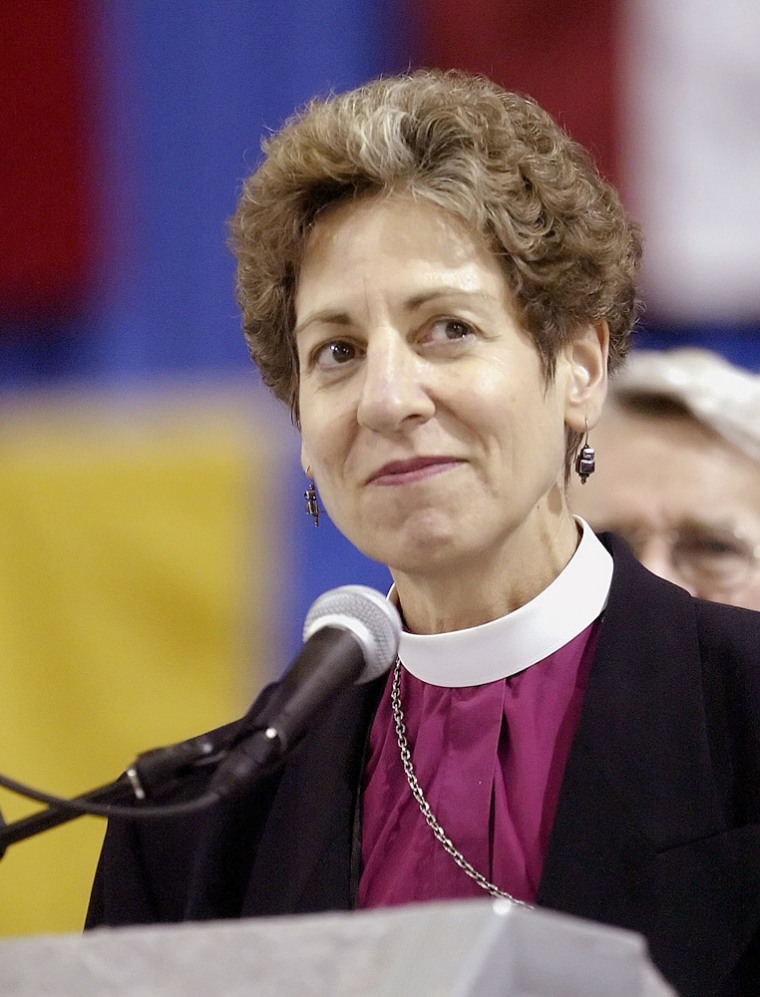The Episcopal General Convention debated another defining vote Monday in the wake of electing its first female presiding bishop: whether the church should temporarily bar gays from becoming bishops to preserve Anglican fellowship.
Delegates began considering a moratorium at the request of world Anglican leaders, who remain angry over the 2003 consecration of the first openly gay Episcopal bishop — V. Gene Robinson of New Hampshire.
But the session ended before any vote could be taken on prohibiting homosexual bishops. Debate was scheduled to resume Tuesday morning, one day before the convention ends.
The Rev. Frank Wade opened the debate in the House of Deputies, comprised of lay people and clergy, by asking delegates not to view the request from Anglican leaders as an ultimatum, but as a plea for peace.
“No one is being asked to stop being different. No one is being asked to stop believing differently from others,” Wade said. “The question is how do we live together.”
Legislation that the deputies adopt then goes to the House of Bishops for final approval.
The Episcopal Church is the U.S. arm of the 77 million-member Anglican Communion. If overseas leaders dislike the outcome of this week’s meeting, the association of 38 national churches could splinter apart. Archbishop of Canterbury Rowan Williams, the communion’s spiritual leader, has expressed concern that the feud over homosexuality and the Bible will cause a permanent rift.
Female leader sparks controversy
The situation has been complicated by Sunday’s election of Nevada Bishop Katharine Jefferts Schori as the first Episcopal presiding bishop — the first woman ever to lead an Anglican province. Only two other Anglican provinces — New Zealand and Canada — have female bishops and many Anglicans believe women should not be ordained.
In a 2004 document called the Windsor Report, Anglicans asked the Episcopal Church for the prohibition on homosexual bishops, a temporary ban on developing official prayers for blessing same-sex couples and an apology for the turmoil caused by Robinson’s confirmation.
An Episcopal committee, of which Wade is a member, drafted legislation in response to the report that stops short of a ban on homosexual bishops. Instead, it urges dioceses to “refrain from” choosing bishops “whose manner of life presents a challenge to the wider church.”
That proposal includes an apology for the pain this causes gays and lesbians.
The measure on same-gender blessing ceremonies directs “this General Convention not proceed to develop or authorize” any such liturgies, while using wording that leaves open the possibility that individual dioceses and priests could conduct the ceremonies informally.
‘Expression of regret’
The proposals also include an “expression of regret” to Anglicans for failing to properly consult them before consecrating Robinson, and an apology for “the consequences that followed.”
The deputies voted 563-267 to adopt the apology measure. Several delegates argued that it would be wrong to apologize for something the church saw as part of its fight against injustice.
Others worried it would set a dangerous precedent that could require expressions of regret on other issues. The Rev. Jorge Gutierrez of the Diocese of Rochester said he feared that “it would not be long before we would also be asked to apologize and repent for the election of” Jefferts Schori. However, supporters of the measure said it was critical toward healing ties with Anglicans.
Also Monday, one of three Episcopal dioceses that rejects ordaining women appealed to Williams for help over Jefferts Schori’s election. Bishop Jack Iker of the Diocese of Fort Worth, Texas, read a short statement from the convention floor asking Williams to put the diocese under the oversight of another Anglican leader. The two other dioceses that do not accept women priests are Quincy, Ill., and San Joaquin, Calif., but the overwhelming majority of Episcopalians support women’s ordination.
